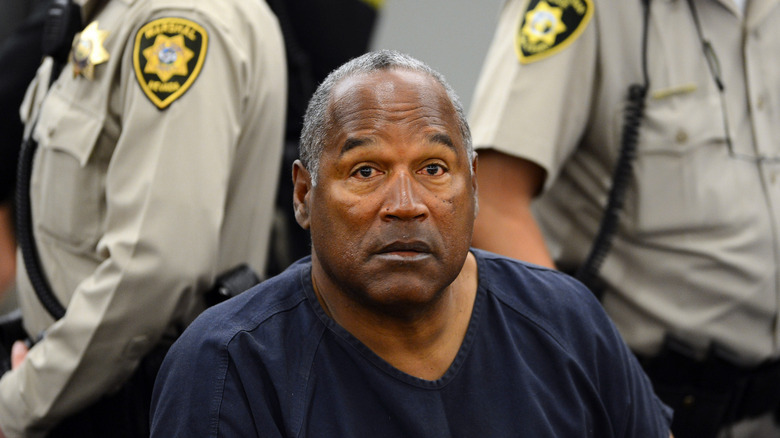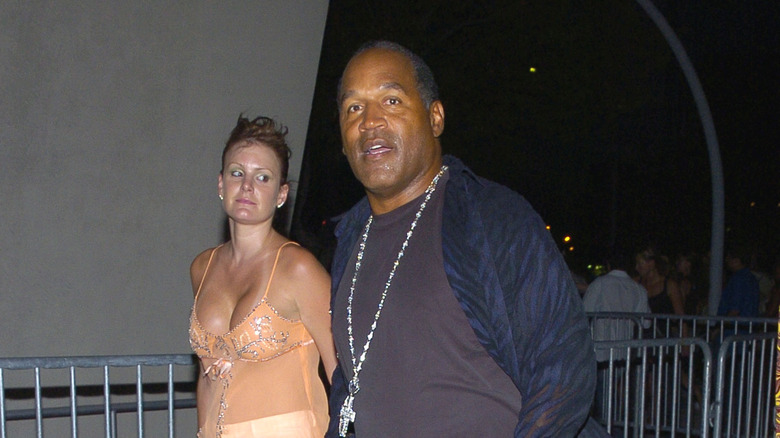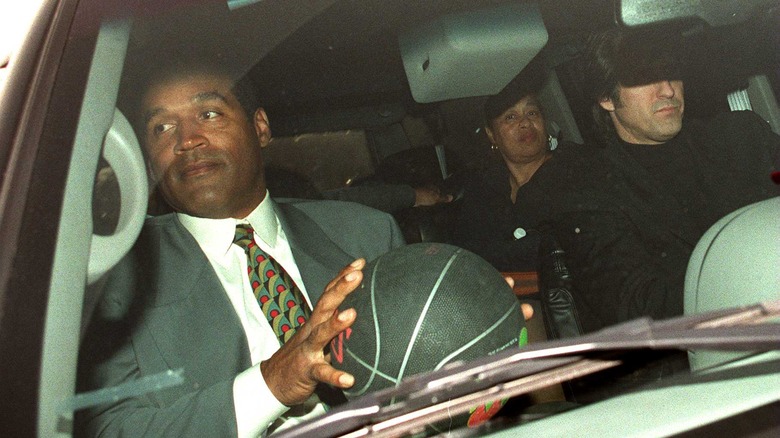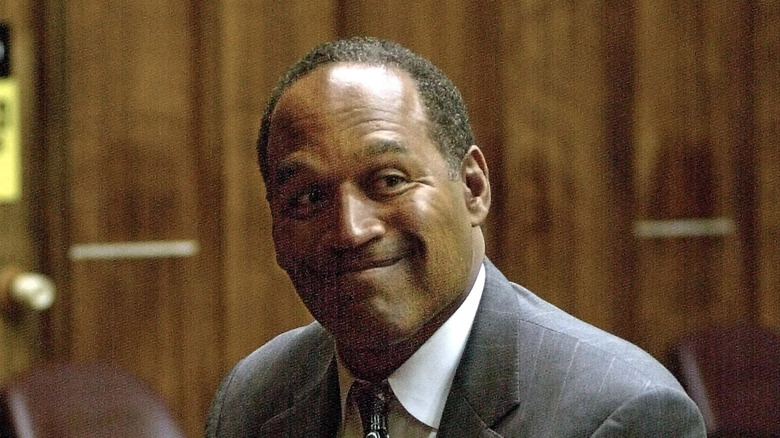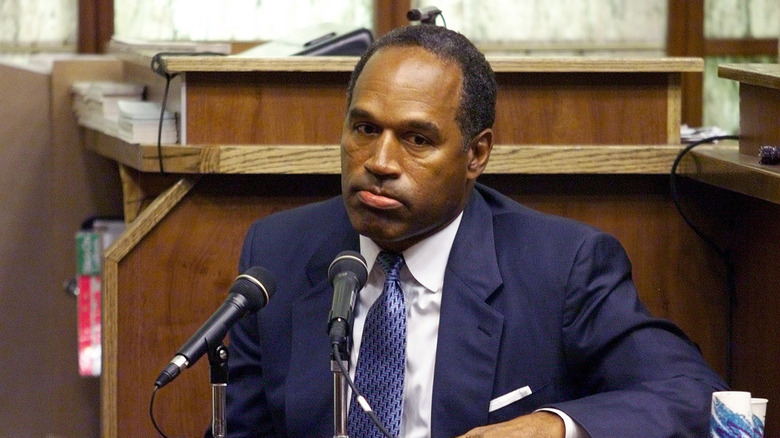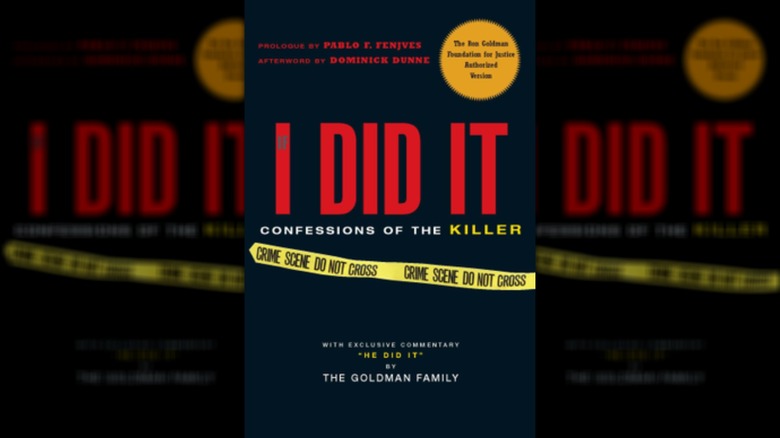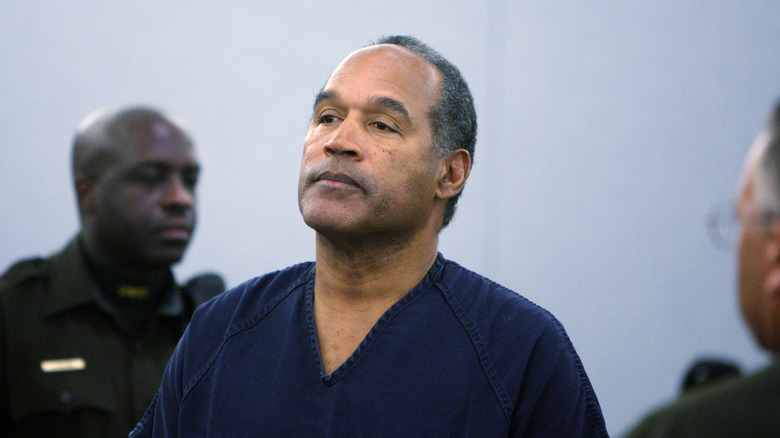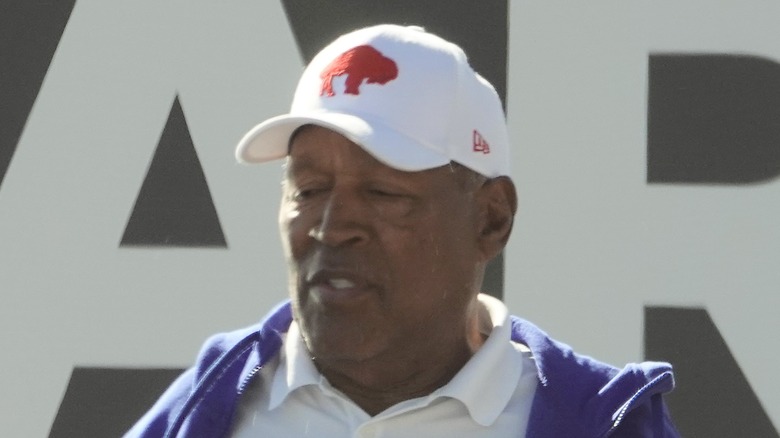What O.J. Simpson's Life Was Really Like After His Infamous Murder Trial
When on April 10, 2024, it was announced that O.J. Simpson had died at his home in Las Vegas at the age of 76, it brought the curtain down on one of the most controversial lives in recent American history. For decades, Simpson was a star, first earning acclaim as an NFL running back in the 1970s, ending his career as one of the greatest players in history, and later as an actor — most notably in the "Naked Gun" franchise. But since the mid-1990s, his name has been synonymous with one thing: going to trial for the double murder of his ex-wife, Nicole Brown Simpson, and her lover Ron Goldman, and the subsequent acquittal which saw him walk free from the "trial of the century," much to the despair of the families of the deceased.
Thereafter, and throughout Simpson's tumultuous post-trial life, the families of the murder victims continued to fight to remind the public of the crimes of which he was accused, even as Simpson attempted to resume his life in the public eye. They even took steps to damage Simpson financially, and were often instrumental in foiling his plans to profit from his notoriety. And Simpson didn't escape prison, either, with a lengthy spell behind bars for his involvement in a Vegas robbery. Here is the highlights reel of how Simpson's life went after his infamous murder trial.
The acquittal party
The O.J. Simpson murder trial was a series of sharp shocks for the American public. But the real bombshell was the verdict, in which the now-infamous sports star was found not guilty of the murder of his ex-wife Nicole Brown Simpson and Ron Goldman. After the verdict was read, Simpson thanked his defense team, his friends, and family, and returned to the same mansion where the low-speed car chase of June 1994 ended with his surrender to police.
Simpson was now a free man, but in the world outside the courtroom, his guilt was still in doubt. In the days following the acquittal, polling showed a marked disparity between how Black and white Americans interpreted the verdict. Most Black respondents believed that the verdict was just and that Simpson was indeed innocent, while white respondents were far more likely to believe that Simpson had escaped justice for his crimes. A 2015 survey revealed that this gap eventually vanished in the following years, according to ABC News.
If Simpson ever believed that his reputation could be rehabilitated immediately following the verdict, he was dead wrong. "After the verdict was handed down, the West L.A.P.D.—because Rockingham is in our jurisdiction—had to send police units over there to O.J.'s house for crowd control and to protect the estate," Detective Paul Bishop told Vanity Fair. As the police guarded the house from a less-than-friendly throng of people, Simpson and his compatriates were oblivious to the outrage, and worked their way through 40 boxes of champagne.
A long-term relationship
Despite his infamy from a well-publicized and highly controversial murder trial, O.J. Simpson retained the support of his family, as well as a wide circle of allies and admirers. One of these was Christie Prody, who would become his romantic partner in the late 1990s, when he was 46 and she was 21. The pair would remain together for 13 years, though multiple news stories exposed the volatility of their relationship, with Simpson once reporting Prody to the police for attacking him at a Miami hotel in 2000, and Prody accusing Simpson of repeatedly threatening to kill her, though Prody never filed formal charges.
After their separation, Prody spoke to the media and claimed that she feared for her life after splitting from Simpson. She characterized him as an abuser who insisted on controlling every aspect of her life, and even kept comparing her to his murdered wife, Nicole Brown Simpson. Speaking to Good Morning America (via ABC News), she said, "It took me many years to realize and face that hard, terrible truth ... Things he's mentioned about Nicole, how she had it coming because of her lifestyle and who she hung out with, mainly Ron Goldman, I guess." Prody, who misused cocaine during her relationship with Simpson, would continue to have substance abuse issues after her split from Simpson, including a jail term for stealing prescription drugs while working as a nursing assistant.
Back in court
Many people believed that a miscarriage of justice spared O.J. Simpson from prison, and for those observers, the U.S. justice system's double jeopardy protection — which prevents two identical prosecutions for the same offense — was hugely frustrating. Nevertheless, the double murders of Nicole Brown Simpson and Ron Goldman brought Simpson back to court once more in the 1990s. This time it was a civil trial, and Simpson did not receive the verdict as jubilantly as in his previous criminal trial.
In 1997, the families of the deceased opened a civil case against Simpson, bringing his alleged crimes back under the media spotlight. However, this course of action could not put him behind bars, since civil cases typically only result in a financial punishment. And punished Simpson was: The civil trial concluded with Simpson being found liable, and ordered to pay $33 million in restitution to the families of the victims, including Goldman's father, Fred, who told The New York Times: "The judgment was really a debtor's prison ... It was to haunt him for the rest of his life, to keep him from ever having anything, making anything, without fearing that Fred Goldman would be right there to collect that dollar."
Fleeing to Florida
In 1997, O.J. Simpson was a free man, but one with a $33 million judgment over his head, which had been ordered to be paid to the families of murder victims Nicole Brown Simpson and Ron Goldman. But Simpson hatched a devious scheme to avoid payment: In March 1997, rumours circulated that Simpson was planning to relocate from his longtime home city of Los Angeles to Florida. On the surface, this might have been seen as an attempt to escape the media storm that had engulfed him on the West Coast since the double murder, but without eschewing sunny weather and access to decent golf courses.
However, Florida also had something very important to Simpson that California did not: laws that prevent the head of a household from being liable for wage garnishment to pay creditors. This meant his new home would protect him from surrendering his earnings, savings, and other assets in light of his civil case defeat. He eventually left California in 2000, and moved into a house 20 miles southwest of Miami.
On the links
O.J. Simpson's love of golf was well known long before his murder trial made him a figure of infamy around the world. He was also associated with the legendary Arnold Palmer, with whom he had starred in several lucrative TV ads for the car rental giant Hertz in the 1980s. After the 1995 trial, Simpson no longer found himself as welcome on the links as before. Indeed, his former favorite golf club – the ritzy and exclusive Riviera Country Club — soon froze him out, and he was forced to vie for tee times with the public at LA's Rancho Park Golf Course.
After he relocated to Florida in 2000, Simpson was a regular feature on the Miami links, though finding a golf partner and a quiet round of golf still proved to be difficult. His reputation meant that other players were often unwilling to share a course with the man who had been at the center of the trial of the century, especially as he continued to attract hordes of press and members of the public, all of whom wanted to catch a glimpse of the former megastar.
"At first he thought he could lead a quiet life, but, because of his infamy, Miami wouldn't let him," Simpson's attorney, Yale Galanter, told the Miami Herald. "I was amazed at how people flocked to him in public, wanting to say hello and snap a photo. Every time he walked into a room you could feel his aura and hear the whispers — 'Did he or didn't he?'"
Claiming trademarks
O.J. Simpson attracted more controversy even before his 1995 criminal trial concluded, when it was revealed that he was still trying to secure profits from his image. In September 1995 – the month before Simpson was acquitted — media outlets revealed that the former NFL Player of the Year had applied to the U.S. patent office to register a number of trademarks associated with him. These included the names "O.J. Simpson" and "O.J.," as well as his nickname, "The Juice." And when was the application made? July 21, 1994, just over one month after Nicole Brown Simpson and Ron Goldman were murdered.
It was reported that Simpson had applied for exclusive rights to print his name on a wide range of merchandise, including toys and video games, sports equipment, clothing — including sports clothes, nightwear, belts, aprons, and more — as well as homewares, jewelry, and paper goods. The story was met with bemusement and derision by many, but not everyone found the story of an accused murderer attempting to profit from his infamy so funny.
One of those unimpressed individuals was New Hampshire patent lawyer William B. Richie, who filed an opposition case to the registration of the trademarks. Ritchie claimed they were scandalous and that they "disparage his values, especially those relating to his family," and took the case before the Federal Circuit, which largely agreed with the basis of his opposition. Simpson eventually dropped his applications.
More brushes with the law
In February 2001, O.J. Simpson was arrested and charged with battery and burglary after a road rage incident two months earlier, all over him running a red light. He was accused of tearing the glasses off an irate driver, scratching his face in the process, and faced 16 years in prison if convicted; he was cleared of all charges. The same year, he was investigated and his home raided by the FBI for potentially being part of a money-laundering crime ring. Simpson was found in possession of TV pirating equipment, and was sued by a satellite network in March 2004. He was ordered to pay a fine of $25,000 plus legal costs.
One year later, Simpson was in the news again, this time after driving a power boat through a manatee zone off the coast of Miami. He was ticketed for the offence, but failed to pay the $65 fine, leading to an arrest warrant. Simpson pleaded innocent to the ticketing, and claimed through his defense attorney, Yale Galanter, that he missed an earlier hearing on the case due to a communication error. The warrant was withdrawn.
It wasn't just tickets Simpson was averse to paying; in 2007, his name appeared alongside the singer Dionne Warwick and the comedian Sinbad on the tax delinquent list for California, on which the Franchise Tax Board shames the top 250 people owing back taxes in the state. The list showed that he owed more than $1.4 million, and that a tax lien had been filed against him in 1999.
His short-lived show 'Juiced'
During the era of "Jackass" and "Punk'd," 2006 saw the bizarre news that O.J. Simpson was to star in his own hidden camera prank show, "Juiced." The show saw him tricking unsuspecting members of the public before announcing, "You've been Juiced!" and was riddled with bad-taste references to Simpson's murder trial. In one skit, he posed as a user car salesman attempting to sell a white Ford Bronco, the same model of car that he had his friend Al Cowlings used in their low-speed police chase through Los Angeles. Another segment saw Simpson pretend to stab a man with a knife after he slipped on a banana peel.
"Juiced" was originally released as a one-off pay-per-view special, was later released on DVD, and was reportedly a critical and commercial flop. Years later, Harmon Leon, who starred as Simpson's accomplice on the show, claimed in an article for Vice that he was hired for the job through a Craigslist ad. It remains a cultural curio of the decade.
The canceled memoir 'If I Did It'
Yet more uproar occurred in 2006, when it was revealed that O.J. Simpson was in line to publish a memoir, with the toe-curling title "If I Did It." The book, which was said to be Simpson's hypothetical account of how he would have committed the murders, was first acquired by publisher Judith Regan, who operated ReganBooks, an imprint for HarperCollins, which in turn was owned by News Corp. Regan was known for publishing controversial works, but her work with Simpson caused widespread outrage, especially from the families of Nicole Brown Simpson and Ron Goldman. In the furor, the book was canceled, Regan lost her job, and News Corp issued an apology.
Simpsons's daughter, Arnelle, whose company maintained the shareholders' rights to the book, attempted to win control of the work. However, in light of the civil case against Simpson, the rights were awarded to the families of his victims. When the book was released, under the title "If I Did It: Confessions of the Killer," the "If" on the title was minimized, with commentators noting that the work indeed contained the closest to a confession that the families were ever likely to see. The book also contained material by the Goldmans highlighting Simpson's guilt, as well as coverage of the civil case.
The law catches up with O.J.
In 2008, O.J. Simpson finally faced time behind bars, though his sentencing had nothing to do with the crimes of which he was famously accused in the 1990s. Instead, he was accused of being involved in a robbery in a Las Vegas hotel, during which a sports memorabilia dealer was robbed of several valuable items and held at gunpoint by five men led by Simpson. He faced 12 criminal charges. After his accomplices testified against him, Simpson was found guilty on all counts and sentenced to 33 years in prison, with the possibility of parole after nine years.
For some, it undoubtedly felt that justice had finally been served. However, for the families of Nicole Brown Simpson and Ron Goldman, the fact that he still hadn't faced prison for their murders or made any effort to pay the restitution that he owed meant that his sentence rang hollow, with Fred Goldman describing the sentencing as "bittersweet" (via Men's Journal).
Simpson was granted parole in 2017, having served nine years of his sentence behind bars. Before his parole board, Simpson claimed that he had led a "conflict-free life," a claim which shocked the Goldmans, with Fred telling ABC News: "Everybody in the world except him knows that he has not led a conflict-free life ... He beat up his first wife, he beat up Nicole numerous times, he had numerous other altercations with people over the years — hardly conflict-free, nor do I suspect it'll ever be conflict-free. He's just not capable of being that person."
Rumors of Ill health were confirmed
Following his release from prison in 2017, O.J. Simpson attempted to resume public life. Living in a gated golf community in Las Vegas, he soon gained yet more notoriety after being banned from the Cosmopolitan Hotel-Casino for disruptive behavior. In return, he sued the establishment for defamation, and the case was settled out of court. Simpson was also a regular user of social media, appearing often in clips recorded at home. In February 2024, he announced to his followers that he had received chemotherapy treatment for prostate cancer, although he denied reports that he had been admitted to a hospice, describing them as bogus. He had previously denied rumors that he had suffered a heart attack.
In 2023, Dr. Bennet Omalu, a famed neuropathologist whose story was partly told in the movie "Concussion," told ABC News that he would "bet [his] medical license" that Simpson was suffering from chronic traumatic encephalopathy (CTE). The degenerative brain disease is often associated with head injuries sustained by professional athletes competing in high-impact sports ... such as American Football. "He was exposed to thousands of blunt force trauma of his brain," Omalu said, in reference to Simpson's stellar NFL career. However, Omalu stopped short of blaming Simpson's criminal past on his supposed injuries.
Died surrounded by family
News of O.J. Simpson's death caused a range of reactions in the media. The announcement was posted on X (formerly known as Twitter), with a statement from Simpson's family: "On April 10th, our father, Orenthal James Simpson, succumbed to his battle with cancer ... He was surrounded by his children and grandchildren. During this time of transition, his family asks that you please respect their wishes for privacy and grace." But despite his family standing by him with love and support in Simpson's final days, the reaction of the world at large proved that, even in death, he remained controversial.
The sports community largely distanced itself from the former star: The NFL acknowledged his death simply with agency copy rather than any highlights of his sporting achievements, and Simpson's former team, the Buffalo Bills, issued no statement. Marcia Clark, the lead prosecutor in his murder case, sent her condolences to Simpson's family while his former lawyer Alan Dershowitz told NBC News: "I knew he was very sick, so I'm upset that he died."
The family of murder victim Ron Goldman shared no sympathy, either. The Goldmans released a statement claiming they felt a "mixed bag of emotions" and thanked their supporters for "keeping our family, and most importantly Ron, in your hearts for the last 30 years." Ron's father, Fred Goldman, said, "The only thing I have to say is, it's just further reminder of Ron being gone all these years."
If you or anyone you know needs help with addiction issues or may be the victim of domestic abuse, contact the relevant resources below:
-
The Substance Abuse and Mental Health Services Administration website or contact SAMHSA's National Helpline at 1-800-662-HELP (4357).
-
The National Domestic Violence Hotline at 1−800−799−7233. You can also find more information, resources, and support at their website.
